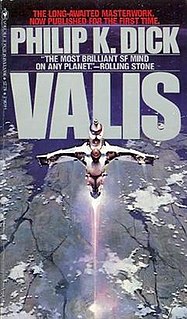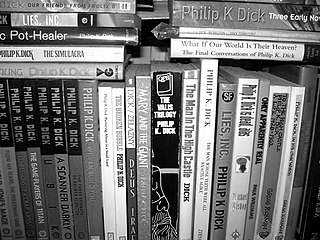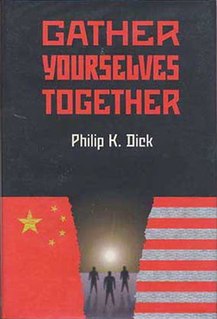
Philip Kindred Dick was an American writer known for his work in science fiction. His work explored philosophical, social, and political themes, with stories dominated by monopolistic corporations, alternative universes, authoritarian governments, and altered states of consciousness. His writing also reflected his interest in metaphysics and theology, and often drew upon his life experiences in addressing the nature of reality, identity, drug abuse, schizophrenia, and transcendental experiences.

A Scanner Darkly is a science fiction novel by American writer Philip K. Dick, published in 1977. The semi-autobiographical story is set in a dystopian Orange County, California, in the then-future of June 1994, and includes an extensive portrayal of drug culture and drug use. The novel is one of Dick's best-known works and served as the basis for a 2006 film of the same name, directed by Richard Linklater.

Do Androids Dream of Electric Sheep? is a science fiction novel by American writer Philip K. Dick, first published in 1968. The novel is set in a post-apocalyptic San Francisco, where Earth's life has been greatly damaged by nuclear global war. Most animal species are endangered or extinct from extreme radiation poisoning, so that owning an animal is now a sign of status and empathy, an attitude encouraged towards animals. The book served as the primary basis for the 1982 film Blade Runner, and many elements and themes from it were used in its 2017 sequel Blade Runner 2049.
The Philip K. Dick Award is a science fiction award given annually at Norwescon and sponsored by the Philadelphia Science Fiction Society and the Philip K. Dick Trust. Named after science fiction and fantasy writer Philip K. Dick, it has been awarded since 1983, the year after his death. It is awarded to the best original paperback published each year in the US.

The Man in the High Castle (1962) is an alternate history novel by American writer Philip K. Dick. Set in 1962, fifteen years after an alternative ending to World War II, the novel concerns intrigues between the victorious Axis Powers—primarily, Imperial Japan and Nazi Germany—as they rule over the former United States, as well as daily life under the resulting totalitarian rule. The Man in the High Castle won the Hugo Award for Best Novel in 1963. Beginning in 2015, the book was adapted as a multi-season TV series, with Dick's daughter, Isa Dick Hackett, serving as one of the show's producers.
"Faith of Our Fathers" is a science fiction short story by American writer Philip K. Dick, first published in the anthology Dangerous Visions (1967).

VALIS is a 1981 science fiction novel by American writer Philip K. Dick. The title is an acronym for Vast Active Living Intelligence System, Dick's gnostic vision of one aspect of God.
The VALIS trilogy is a set of science fiction/philosophical novels by author Philip K. Dick which include VALIS (1978), The Divine Invasion (1980), and The Transmigration of Timothy Archer (1982). Dick's first novel about the VALIS concept originally titled "VALISystem A", was published as Radio Free Albemuth after Dick's death in 1982.
Pronoia is a neologism coined to describe a state of mind that is the opposite of paranoia. Whereas a person suffering from paranoia feels that persons or entities are conspiring against them, a person experiencing pronoia feels that the world around them conspires to do them good. In 1993 the writer and Electronic Frontier Foundation co-founder John Perry Barlow defined pronoia as "the suspicion the Universe is a conspiracy on your behalf".
The Owl in Daylight is a novel which Philip K. Dick was writing at the time of his death in 1982. He had already been paid an advance for the book by the publisher and was working against a deadline. After his death, his estate approached other writers about the possibility of someone completing the novel based on his notes, but that proved to be impossible, as he had never formally outlined the story. Dick viewed the novel as his Finnegans Wake. The idea was inspired partly by an entry in the Encyclopædia Britannica on Beethoven that referred to him as the most creative genius of all time, partly by traditional views of what constitutes the human heaven, and finally by the Faust story.
"The Eye of the Sibyl" is a science fiction short story by American writer Philip K. Dick. It was written sometime around 1975, but not published until 1987 when it was included in volume 5 of The Collected Stories of Philip K. Dick, and has been reprinted since in other editions of this book such as the U.S. edition The Eye of the Sibyl and Other Stories.
"Roog" is a science fiction short story by American writer Philip K. Dick. It was his first sold work, although not his first published story.

The bibliography of Philip K. Dick includes 44 novels, 121 short stories, and 14 short story collections published by American science fiction author Philip K. Dick during his lifetime.

Gather Yourselves Together is an early novel by the science fiction author Philip K. Dick, written around 1948–1950, and published posthumously by WCS Books in 1994. As with many of his early books which were considered unsuitable for publication when they were first submitted as manuscripts, this was not science fiction, but rather a work of straight literary fiction. The manuscript was 481 pages in length. At the time it was published, it was one of only two Dick novels for which the manuscript was known to exist which remained unpublished. The other, Voices from the Street, was published in 2007.
"Not by Its Cover" is a science fiction short story by American writer Philip K. Dick, a sequel to his first published science fiction short story, "Beyond Lies the Wub". The story continues the former's theme of immortality, although not focusing on a living Wub itself, but rather its fur.

Lawrence Sutin is the author of two memoirs, two biographies, a novel and a work of history.
"The Great C" is a science fiction short story by American writer Philip K. Dick. It was first published in 1953 in Cosmos Science Fiction and later in The Collected Stories of Philip K. Dick, and parts of the work along with Planet for Transients were later used in the full-length novel Deus Irae. It has since been republished several times, including in Beyond Lies the Wub in 1988.

Philip K. Dick's Electric Dreams, or simply Electric Dreams, is a science fiction television anthology series based on the works of Philip K. Dick. The series consists of ten standalone 50-minute episodes based on Dick's work, written by British and American writers. It premiered on Channel 4 in the United Kingdom on 17 September 2017, and in the United States on Amazon Video on 12 January 2018.











